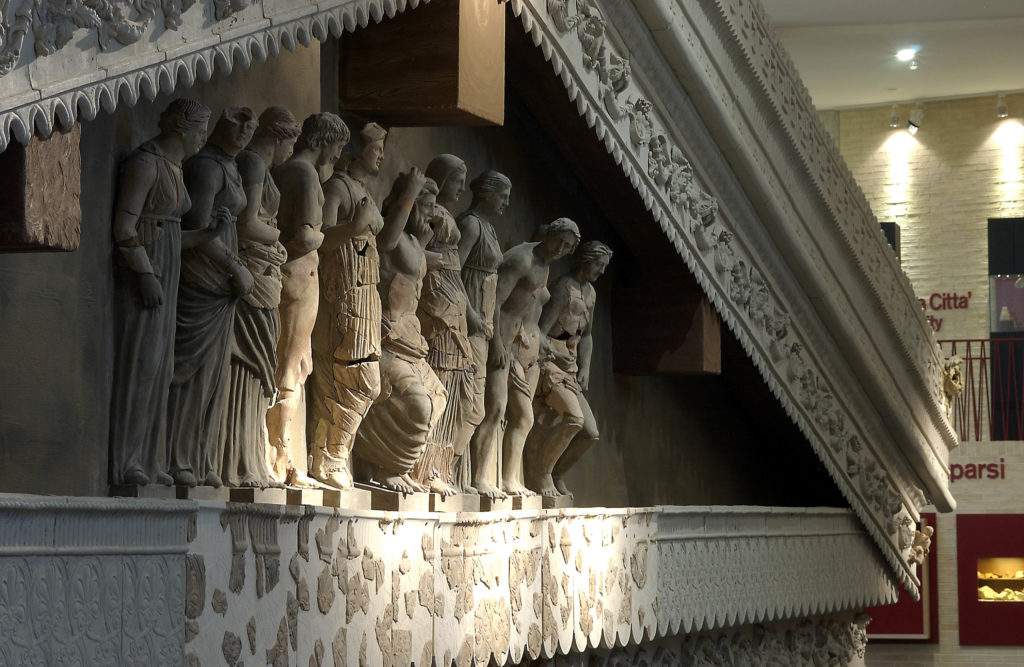Chieti, National Archaeological Museum closes due to lack of staff. "Serious impairment."
The National Archaeological Museum “La Civitella” in Chieti closes to the public after 20 years since its opening. The problem? Covid has nothing to do with it this time: in fact, the Abruzzo museum is closing due to staff shortages. The institute had been opened on Nov. 18, 2000, in a building specially designed by architect Ettore De Lellis, with the aim of allowing the protection, enhancement and enjoyment of the temples and amphitheater of the acropolis of Chieti, as well as the finds recovered during the excavations of the latter and objects from the collection of the erudite Vincenzo Zecca, from the Antiquarium Teatino and from the archaeological investigations of Chieti and the Marrucina area. An itinerary that thus covers a time span from the Paleolithic to the 1800s, in a modern and engaging museum.
Making the announcement last Feb. 3(EDIT: the official version, which arrived the following day, speaks instead of closure for maintenance of premises subject to water infiltration and for staff vacation disposal: more information in this article) and explaining why the closure was Adele Campanelli, former MiBACT official and manager as well as for ten years director of the Theatine museum, who precisely spoke of closure “due to staff shortage.” “Unlike the other institutions temporarily blocked by Covid,” Campanelli wrote, “the museum dedicated to the history of the city of Chieti does not reopen even with reduced hours. I can’t help but feel very sorry that so many resources, so many hopes and the commitment of so many professionals and collaborators are being wrecked in this way at a time of crisis that runs through all areas of our lives. Certainly it is not the closing of a museum that will be able to shake the spirits made heavy by far other losses. However, it is also worth reflecting on this loss, which will hopefully not be final but certainly painful.”
“The Civitella museum,” Campanelli explains, “represented for this town a gamble and an attempt to make public and accessible to the city the results of archaeological research that restored to the beautiful town the depth and dignity of the history that had long seen it hegemonic of the territory at the foot of the eastern Maiella. In the museum with displays and settings, this glorious history had been told to citizens with rigor and passion, eschewing the trite didactic gimmicks that have turned so many museums into boring manuals. The success of its solutions was appreciated and admired by specialists and ordinary people who also expressed their appreciation in publications and commentaries. The city has poured into its halls and park on several occasions attracted by varied and high-profile programming. Many young professionals were trained on the various occasions: archaeologists, architects, historians, restorers, artists, photographers, musicians, actors, dancers, sportsmen, event organizers etc. Now in this city there is no place for that dream, and young people will not have a chance to visit those halls to learn about their past. The meager units are concentrated on the Villa Frigeri museum that has always been antagonistic to the new institution. Old personalistic rusts have taken over the weaker structure orphaned of almost any direction. I can only regret and helplessly witness this further serious impairment that Chieti suffers today.”
The museum depends on the Abruzzo Regional Directorate of Museums, one of the Ministry of Cultural Heritage’s museum hubs, and it is hoped that it will be able to reopen. Buffer solutions will probably be found (as happened with the National Library of Lucca, which was in danger of closing for the same reason: there, staff from Ales, MiBACT’s in-house company, was used). Still, it is bad enough that it had to come to this point.
Among the first to comment was the association Mi Riconosci, which has always been active in protecting cultural places and those who work within them. “Very long is the list of cultural places at risk for this very reason,” the activists comment. “And to make matters worse, often, as in the aforementioned Lucca case, the use of volunteers or outsourced staff is used to foil closures. That is why the answer cannot be found, as some have called for, in help from voluntary associations or students. Placebos of this kind are dangerous: they do not create jobs and too often turn volunteerism and precariousness into long-term solutions.” What is therefore called for from MiBACT is a responsible intervention that can return its museum to the Theatine area.
Pictured: a room of the National Archaeological Museum “La Civitella” in Chieti.
 |
| Chieti, National Archaeological Museum closes due to lack of staff. "Serious impairment." |
Warning: the translation into English of the original Italian article was created using automatic tools. We undertake to review all articles, but we do not guarantee the total absence of inaccuracies in the translation due to the program. You can find the original by clicking on the ITA button. If you find any mistake,please contact us.



























